Throwing Stones XVIII: Merciless Angels
(This is Part XVIII. Click here to read Throwing Stones Part XVII: You Gotta’ Move)
In Part XVII, a last-minute agreement made the Altamont Speedway the new site of the free festival created to cap The Rolling Stones’ successful North American tour.
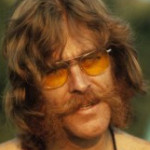 By the end of the sixties, Chip Monck had earned a hard-won reputation as one of the best stage, sound and lighting guys in the business. Having completed preparations for the free concert at the Sears Point Raceway, Monck suddenly had less than two days to tear everything down, truck it fifty miles east to the Altamont Speedway, and set it all up again. Like Tour Manager Sam Cutler, Chip Monck was a trooper. He rallied his largely volunteer crew and pulled off the final miracle of the improbable 1969 tour.
By the end of the sixties, Chip Monck had earned a hard-won reputation as one of the best stage, sound and lighting guys in the business. Having completed preparations for the free concert at the Sears Point Raceway, Monck suddenly had less than two days to tear everything down, truck it fifty miles east to the Altamont Speedway, and set it all up again. Like Tour Manager Sam Cutler, Chip Monck was a trooper. He rallied his largely volunteer crew and pulled off the final miracle of the improbable 1969 tour.
Upon arriving at Altamont, Monck discovered that the new venue’s topography presented him with several stage placement options—all of them lousy. With well over 100,000 fans expected to attend the free festival, the stage would have to be built on the acreage surrounding the track, and the fans would have to seat themselves on the grass. At Sears Point, Monck had positioned the stage at the crest of a steep drop-off, lifting it some eight feet above the audience. At Altamont, the best choice for sightlines and speaker tower positions put the Stones at the base of the hills in a low bowl.
The stage was only 39 inches tall, and there was no time to bring in risers and boost its height. Monck’s crew began the build. It was too late to mull things over, and Monck was thinking like a stage designer, not a security expert. In fact, it appears perilously little thought had been given to security throughout the tour.
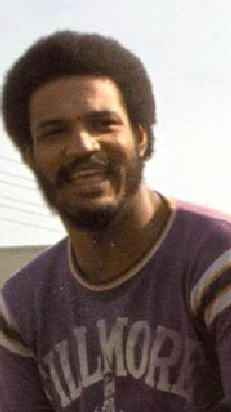 Incredible as it seems today, the Stones had hired just one man to handle security for the entire enterprise. Tony Funches was an African American Viet Nam war vet, raised by strict parents in the gospel church. He was big man who only used his fists when all else failed. Fortunately, there had been few incidents during the tour. As the band’s bodyguard, Funches spent most of his time fending off the endless stream of fans, groupies and hustlers who concocted ingenious schemes to meet the Stones. He also intercepted audience members who leapt onstage and made mad dashes at Mick, returning them to the crowd with the catch-and-release care of a conscientious angler.
Incredible as it seems today, the Stones had hired just one man to handle security for the entire enterprise. Tony Funches was an African American Viet Nam war vet, raised by strict parents in the gospel church. He was big man who only used his fists when all else failed. Fortunately, there had been few incidents during the tour. As the band’s bodyguard, Funches spent most of his time fending off the endless stream of fans, groupies and hustlers who concocted ingenious schemes to meet the Stones. He also intercepted audience members who leapt onstage and made mad dashes at Mick, returning them to the crowd with the catch-and-release care of a conscientious angler.
The Stones even kept the cops out of the arenas for most of the shows, much to the chagrin of local police chiefs. The harsh tactics deployed against demonstrators during the sixties had tarnished American law enforcement’s public image. Minorities and young people were the most disaffected, but the savage clashes between police and protestors throughout 1968 left many older, white Americans shaking their heads as well.
Mick Jagger made it clear that he didn’t want the cops anywhere near the free festival. But there were no funds available to pay for large scale private security. When Jagger openly wondered who could handle the job, San Fran scenester and former Grateful Dead manager Rock Scully offered what he thought was an ideal solution: The Hells Angels.
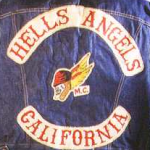 This suggestion seemed somewhat reasonable in 1969, especially if you were English. There were English Hells Angels, fifty of whom had helped out with The Rolling Stones successful free concert in Hyde Park. So when Scully pitched the American Angels in glowing, countercultural terms, describing the bikers as “righteous” and “dignified,” it sounded good to the Stones.
This suggestion seemed somewhat reasonable in 1969, especially if you were English. There were English Hells Angels, fifty of whom had helped out with The Rolling Stones successful free concert in Hyde Park. So when Scully pitched the American Angels in glowing, countercultural terms, describing the bikers as “righteous” and “dignified,” it sounded good to the Stones.
Though some accounts continue to claim that the English Hells Angels handled security for the Hyde Park show, London’s famed police force was very much in evidence. The Stones even made their way to the stage in a Police armored car. Scotland Yard’s internal report dismissed the Angels’ security efforts as “totally ineffective.” Hardly surprising, since the circa ’69 English Angels were primarily wannabes who dressed like American bikers. Photos from Hyde Park reveal many of them to be teenage boys too young to shave.
The American Hells Angels, by contrast, were hardened outlaws. They had little use for hippies, though they enjoyed sex, drugs and rock ’n’ roll as much as the next dude. Probably more. Okay, a lot more.
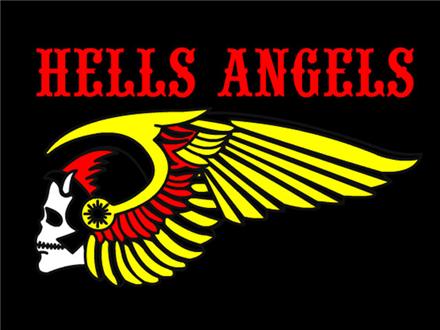 During the rise of the San Francisco scene, a symbiotic relationship had evolved between musicians, event organizers and local Hells Angels chapters. When the bikers attended a show, they quickly staked out their turf, which fellow concertgoers nicknamed “Angel Land.” It was a land most non-Angels feared to tread. Organizers and promoters soon realized that by encouraging the strategic placement of Angel Land, they could create a buffer zone between the audience and potential problem areas like the soundboard, the power generators or the backstage entrance. The Angels were happy to occupy the suggested piece of real estate in exchange for cases of free beer.
During the rise of the San Francisco scene, a symbiotic relationship had evolved between musicians, event organizers and local Hells Angels chapters. When the bikers attended a show, they quickly staked out their turf, which fellow concertgoers nicknamed “Angel Land.” It was a land most non-Angels feared to tread. Organizers and promoters soon realized that by encouraging the strategic placement of Angel Land, they could create a buffer zone between the audience and potential problem areas like the soundboard, the power generators or the backstage entrance. The Angels were happy to occupy the suggested piece of real estate in exchange for cases of free beer.
The highpoint of Hells Angels/Frisco Music Scene cooperation occurred in June of 1967, at the Magic Mountain Music Festival, high atop Mount Tamalpais in Marin County. The festival featured a stellar lineup, including The Byrds, The Doors and Jefferson Airplane. As detailed in Rolling Stone, the Angels shuttled several artists up the steep mountain to the stage on their Harleys. A peaceful, sun-drenched gathering was enjoyed by all.
Two less-than-groovy years later, Woodstock sent a whiff of that old Summer of Love spirit back into the air. In late November, 1969, the Oakland and Frisco Angels casually cut a deal involving the upcoming Bay Area concert. Most accounts claim that Sam Cutler and Rock Scully bargained with the bikers, but all of the key players have spent decades disputing exactly who was involved and exactly what, if anything, was agreed upon.
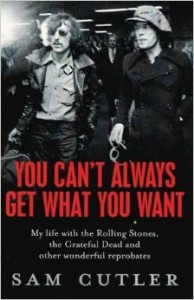 Sam Cutler has consistently stated that his conversation never went beyond the Angels placing themselves around the generators and receiving some beer for the favor. Cutler says he put up $500 in beer money out of his own pocket, having been promised that the other acts would pitch in and repay their share. (They never did.) Angels Godfather Sonny Barger says he told the concert organizers that his guys were nobody’s cops, but they would be willing to sit on the front edge of the stage to keep others off of it. Ronnie Schneider has repeatedly made it clear that he was the Stones’ sole representative for the tour, and neither he nor the band ever authorized, approved or issued funds to hire the Angels to serve as security—or anything else. Ultimately, the bikers came away with the understanding that they would help protect the equipment and musicians at the free festival in exchange for that $500 worth of beer.
Sam Cutler has consistently stated that his conversation never went beyond the Angels placing themselves around the generators and receiving some beer for the favor. Cutler says he put up $500 in beer money out of his own pocket, having been promised that the other acts would pitch in and repay their share. (They never did.) Angels Godfather Sonny Barger says he told the concert organizers that his guys were nobody’s cops, but they would be willing to sit on the front edge of the stage to keep others off of it. Ronnie Schneider has repeatedly made it clear that he was the Stones’ sole representative for the tour, and neither he nor the band ever authorized, approved or issued funds to hire the Angels to serve as security—or anything else. Ultimately, the bikers came away with the understanding that they would help protect the equipment and musicians at the free festival in exchange for that $500 worth of beer.
It was a turning point that would haunt the Rolling Stones for the rest of their lives.
(This concludes Part XVIII. Click now to read Throwing Stones Part XIX: No Shelter)
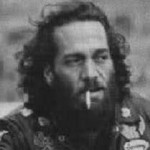
Dale R.
Lots of info here that I didn’t know. The rest of the story was told somewhere in the lyrics to Don McLean’s “American Pie” as I recall. That might make an interesting talk show, Mick and Mclean discusing the lyrics to “American Pie” and “Sympathy for the Devil.” No Hells Angels required.
Larry McC.
I had no idea that there were “English” Hell’s Angels. I imagine them having scones and tea, then telling someone, “Terribly sorry, but we’re going to beat the living daylights out of you…”
Dan O.
This series just keeps getting better, reading like chapters of the book it needs to be. I love the way you are building suspense in this segment and the one before, and I’m really enjoying getting the details of events I have up to now only known the broad outlines of. Looking forward to the next installment.
Ro
The “next chapter” is always anticipated by me, as well as others. Musically speaking, those were groovy times compared to the scene today.
Tom C.
As your email promo said, “America’s most notorious outlaw motorcycle gang got a weekend gig playing rent-a-cop for the concert that killed the sixties.” That sums it up brilliantly, Bill, keep up the good work!
Dave L
I remember you telling me years ago that some English Hell’s Angels didn’t even have motorcycles. I guess you’ve gotta start somewhere, but c’mon, mate. I’m learning a lot from this series. Dan O’s right–excellent writing and reporting, with just enough suspense to keep me needing more.